Professor Richard Wolf’s office holds a story.
The walls of his space, located in towering Memorial Hall, are covered with instruments from South and Central Asia and Africa. These include nearly a dozen vinas that he maintains in fine playing condition for his students. These large lutes are, in name at least, one of India’s oldest instruments; they’re also one of the main instruments in Karnatak music, a classical style from southern India. Each pear-shaped apparatus is a craftsman’s delight, carved meticulously of jackfruit wood: from the head of the mythic yazhi, the stringed hollow neck tapers down to a swollen round body and is adorned with deer antlers (or plastic, as is common nowadays). Vinas – and the ethnomusicology of South and Central Asia – are the life’s work of Richard Wolf, Professor of Music and Professor of South Asian Studies at Harvard University.
Growing up in Chicago in the 1960s, Wolf remembers first hearing melodic hints of Indian classic music in his Beatles records. George Harrison embraced the twang of the sitar and rhythm of the tabla, releasing three records flavored with Indian elements. Wolf was inspired to pick up the guitar at age 13, eventually joining a rock band, composing original material, and playing lead guitar.
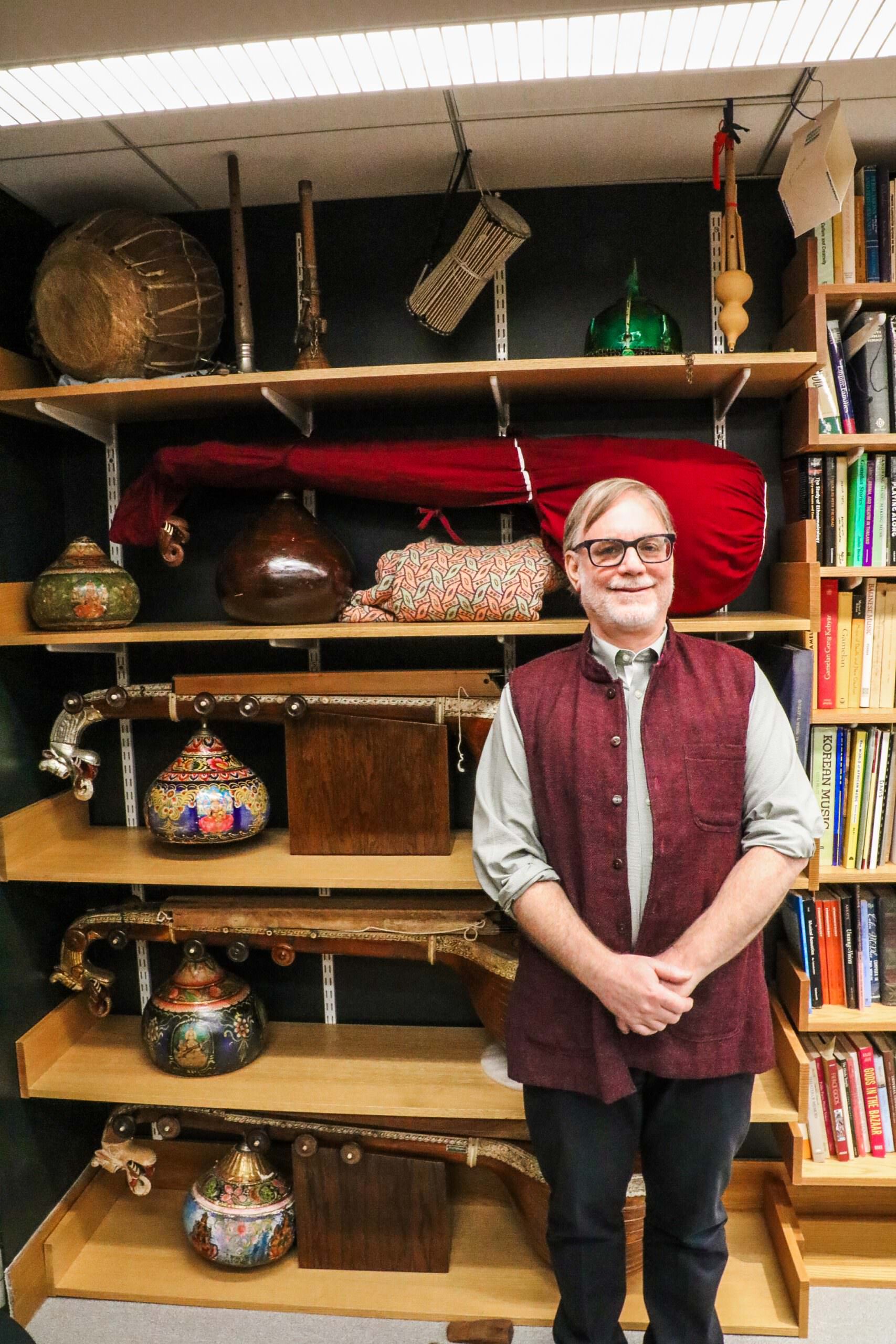
Richard Wolf, Professor of Music and Professor of South Asian Studies at Harvard University | Photo by Kellie Nault.
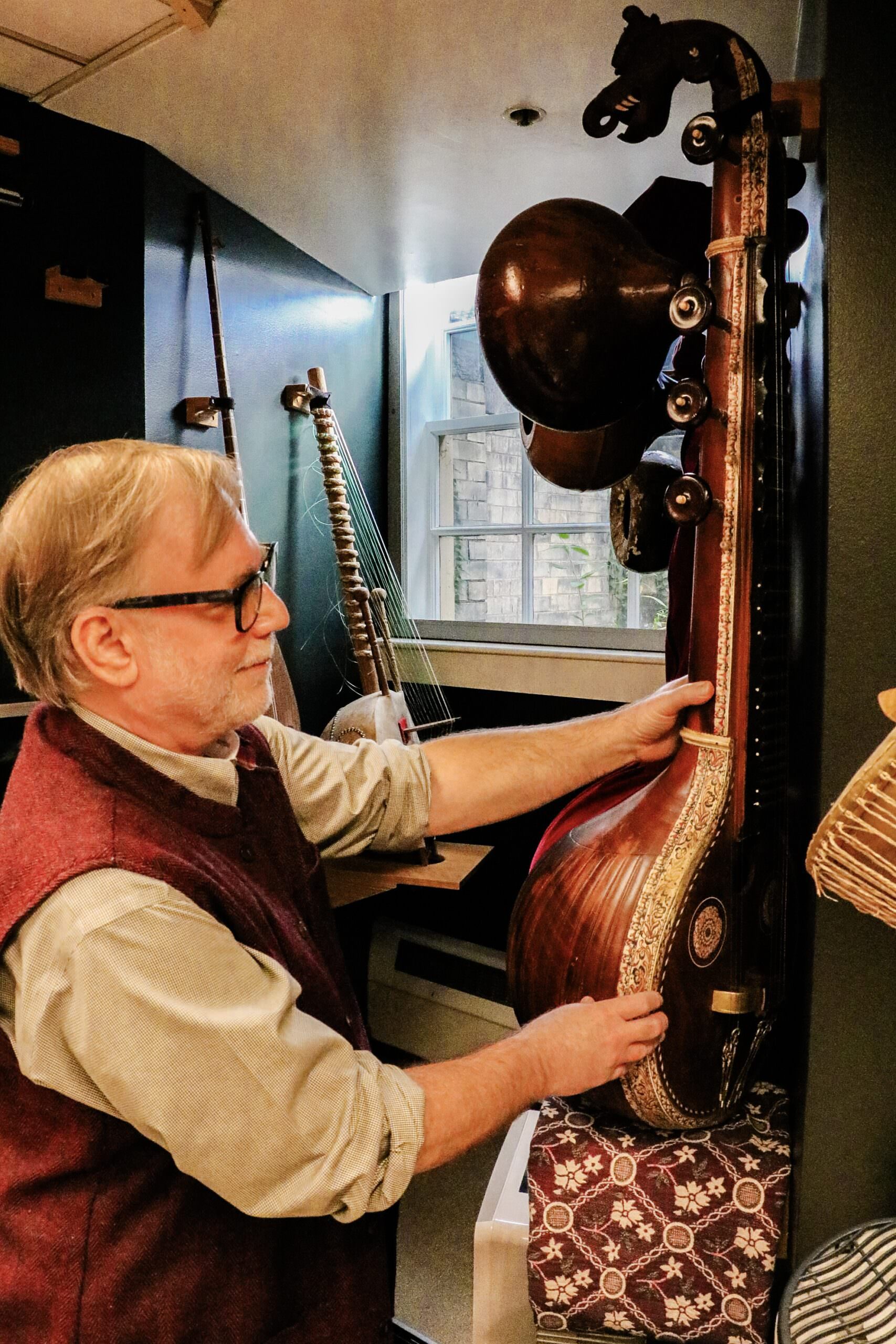
Professor Wolf shows one of his vinas, a large lute that is a main instrument in Karnatak music | Photo by Kellie Nault.
When he was a freshman at Oberlin College, with intended majors in mathematics and music, his career plans pivoted. The acclaimed south Indian flutist and vocalist T. Viswanathan performed a Karnatak concert with mridangam maestro, Ramnad Raghavan. Their mastery of Indian classical music – which is rhythmically and timbrally complex, full of improvisation, and never performed from a score – ignited a new passion in Wolf.
“Their performance simply blew me away,” Wolf recalls. “It was from that moment that I developed a love of Indian classical music, and I immediately began taking drum lessons from Raghavan.” Eventually, as a junior in college, Wolf traveled to India for a year, where he began learning the vina. This evolved into return trips for intensive vina and vocal training under such masters as Karaikudi Lakshmi Ammal, Kamala Ramamurthy, and for a great many years, Ranganayaki Rajagopalan.
Wolf says he can vividly recall the first moment he stepped foot on Indian soil. He was initially drawn to the music, but once reaching the subcontinent, “I was struck by the range of smells, the rich sensory experience of colors, of the food . . . I became interested in how various aspects of Indian life were intertwined and was introduced to cultural anthropology.”
Embedded with the Kotas
There are a multitude of Indian musical genres, each with its own integrity, each requiring its own training. “The range of Indian music shows the remarkable ingenuity that all cultures possess. And, of course, ‘Indian culture’ is not just one culture,” explains Wolf. Much of Indian classical music is cultivated in the urban areas, yet Wolf yearned to spend time in more rural environments, to embrace the beauty of India while immersing himself in the study of music as part of everyday life. So drawing upon his Tamil language and musical skills, Wolf sought a new subject for ethnomusicological research and found rich possibilities with the Kotas, an indigenous group in the Nilgiri mountain range in Tamil Nadu famous for their many artisanal skills, including musicianship.
“Some indigenous Indian communities now live under extremely unfortunate circumstances … The Kotas are not among them; they have done well for themselves,” explains Wolf. “They have access to education and often hold excellent jobs. They’re very much part of modern society, but also absolutely committed to their language and their elaborate ritual and cultural practices.”
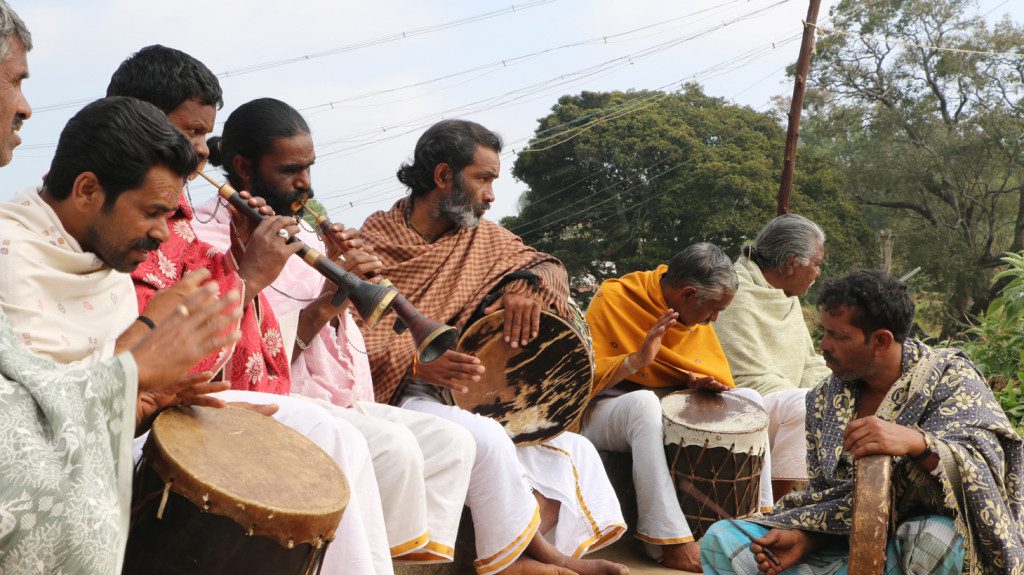
The film Pots of Millet, Faces of Gold, thematizes music and the transformation of materials, bodies, and spiritual entities in the lives of the Kota tribal minority | Photo by Richard K. Wolf.
Kotas have a deep commitment to music, with ceremonial songs and instrumental melodies playing a constituent role in their ritual system. Their main instrument for ceremonies and dancing, the kol, is a wooden shawm with a pirouette made of local materials (Wolf’s is carved from wild boar tusk). Kotas select a particular kind of reed from the forest and boil it in buffalo broth before cutting and tying it for use on the instrument.
As a westerner, Wolf had to “earn his place,” so to speak. “When I started living in Kolmel village, an elder musician doubted that I could ever really understand Kota music—until he heard me play the vina,” laughs Wolf. That gave him some legitimacy with this musician, who made time to demonstrate and teach his repertoire, and put up with Wolf’s ceaseless questions. The younger generations identified with Wolf’s being an American, as they saw themselves as “free” (“like Americans”) as compared to the majority Tamil society around them. Music and freedom were two foundations upon which many Kotas built their relationships of friendship and trust with Wolf, which have endured for over 30 years.
Wolf has now begun transforming his musical journey with the Kotas into a series of films, Pots of Millet, Faces of Gold, which last year earned him a Mittal Institute faculty grant and an award from the Dean’s Competitive Fund for Promising Scholarship. Wolf has completed a cut of the first film in the series. “These films are trying to bring together different moments in time, to trace changes in Kota society and changing relationships between myself and all those Kotas whom I’ve known through the years,” says Wolf.
Working With the Wakhis
After arriving at Harvard as an assistant professor in 1999, Wolf penned his first book, The Black Cow’s Footprint: Time, Space, and Music in the Lives of the Kotas of South India. He came to Harvard having already completed two years of multisited fieldwork in India and Pakistan on his next project, ritual drumming in the context of public Islamic observances. Over the next decade he set to work on the hybrid ethnographic novel The Voice in the Drum: Music, Language, and Emotion in Islamicate South Asia (He explains the genesis of this book project, literally in a dream, in this book trailer). The somewhat alienating experience of working in short spurts across a vast geographic expanse for this project kindled his desire to return to “research experiences that were more intimately connected with people and in which I was playing music—as in my first experiences learning the vina and later living closely with the Kota community,” he explains. That’s when he embarked on a years-long music-and-language study with the Wakhi people, an Eastern-Iranian language speaking Ismaili community who live in the Pamir mountains of Central and South Asia.
“I ended up studying Wakhi sung poetry somewhat serendipitously. The only funding that would allow me to go to Tajikistan to further my music and Persian studies was a Fulbright Regional Research grant, which required study in two or more South and Central Asian countries. So I found a way to connect my new work in Central Asia to my earlier experience conducting research in Pakistan,” he says. His project evolved into a study of Wakhi music and language in Tajikistan, Afghanistan, Pakistan and Western China.
Wolf and his family moved to Tajikistan’s small green capital city of Dushanbe, where he would spend time working closely with the highly regarded Tajik singer Ismoil Nazriev. Then he would pack his things and journey by land cruiser for 17 or more hours into the heart of Wakhan, where he would conduct interviews, record and learn to sing Wakhi songs, and sit for long hours writing out Wakhi texts. His newfound friends worked with him for years, helping him learn how the language and poetry worked.
“Following that first year, I would travel to Tajikistan for periods of weeks or months, often several times a year, over the course of a decade. In 2015, I had the chance to cross the Oxus river and explore the poetry and music of Wakhis on the Afghan side of the border and began to include a cross-border excursion at least once a year.” In 2021 Wolf released Two Poets and a River, an ethnographic film featuring the prominent Wakhi poet-musicians Qurbonsho in Tajikistan and Daulatsho in Afghanistan, telling their own stories in their own languages. The film explores love and loss through their musical poetry and features glorious mountain landscapes in the summer and the depths of winter.
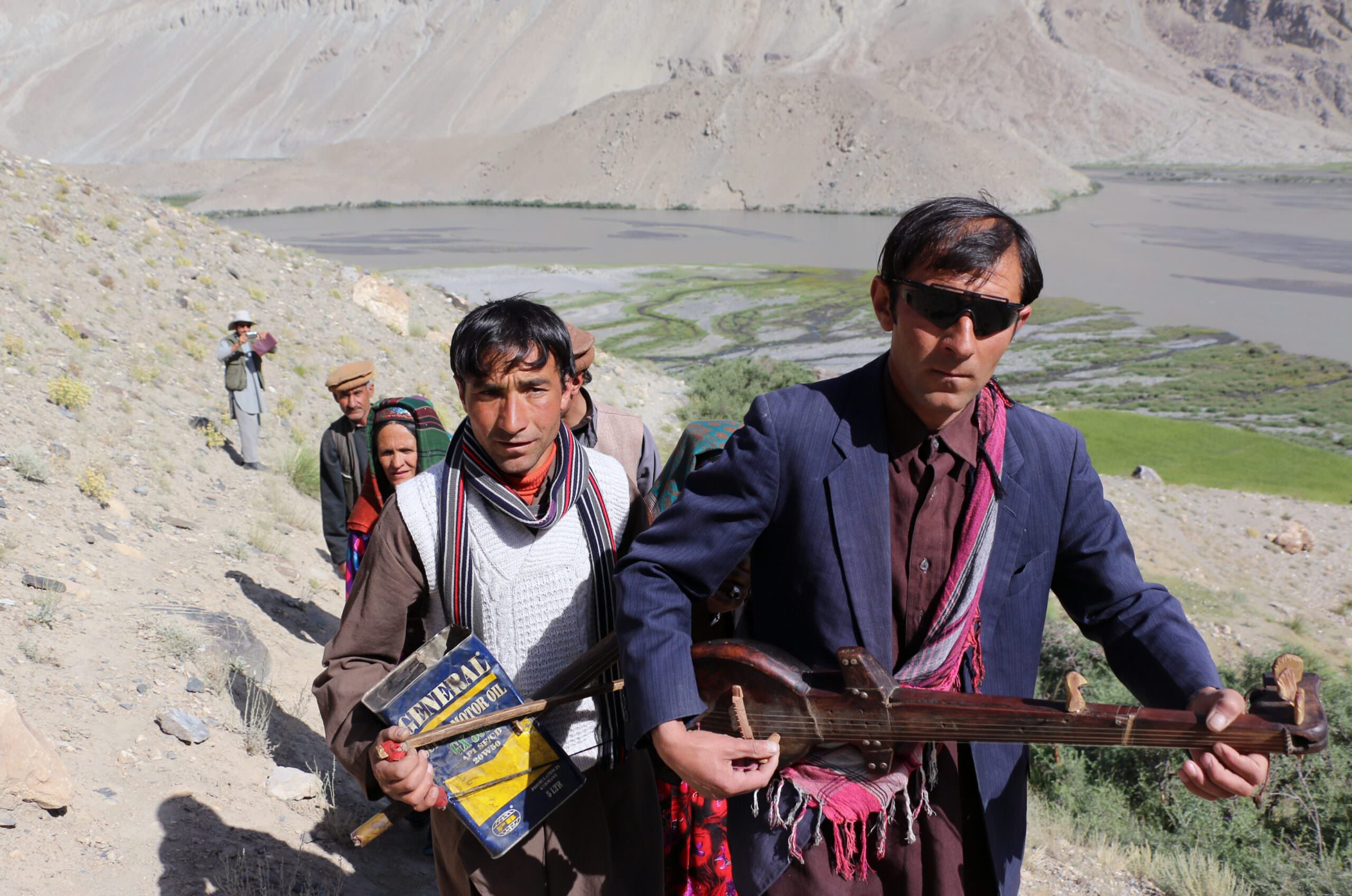
Wakhi singer and composer Daulatsho from Aghanistan walks to an upper pasture in Yur | Photo by Richard K. Wolf.
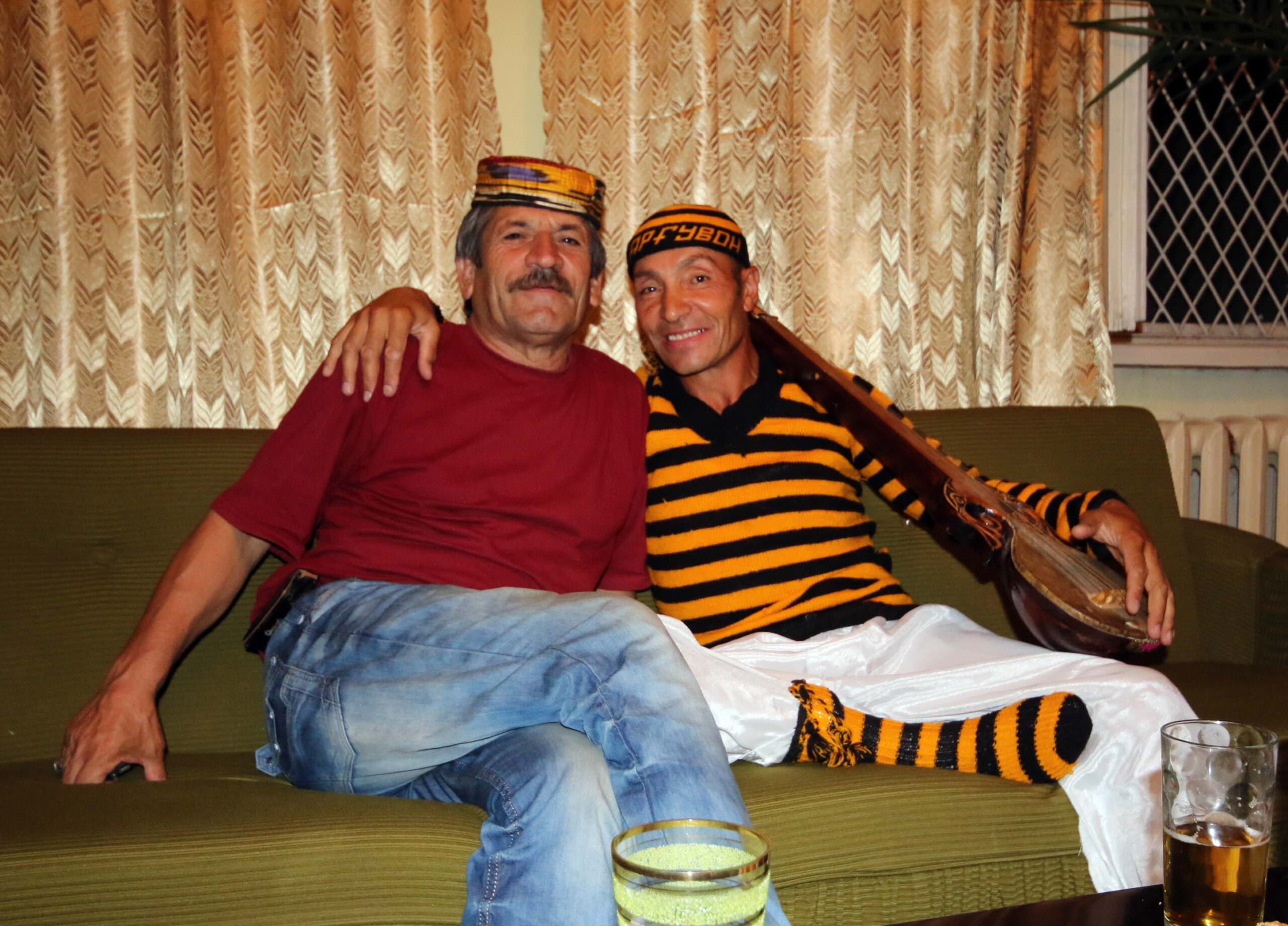
Shauqmamad Pulodov and Wakhi poet-musician Qurbonsho from Tajikistan | Photo by Richard K. Wolf.
“Wakhis in Tajikistan were at the far southeast extreme of what used to be the Russian empire. And the Wakhis in Afghanistan were part of the buffer zone created between British India and the Russian empire during the 19th century. So they have been divided by these world powers and rarely able to communicate with one another directly … but they continue to identify themselves as the same people: they speak the same language and identify with the same religion,” explains Wolf. Despite the economic and cultural differences brought on by national and historical circumstances, Wakhis on both sides of the river share a deep sense of connection with one another.
It is remarkable that this music can be a point of connection that continues to link these two long-separated branches of the same community.
“Wakhis use an unusually tuned instrument called balandzikom to accompany their contemplative, often mystic, singing in Persian. Wakhis have different styles of playing the balandzikom on either side of the border, but the tuning is the same, as is the overall approach to and context for singing the Persian poetry. It is remarkable that this music can be a point of connection that continues to link these two long-separated branches of the same community.”
An International Honor
This past summer, Wolf was honored by the International Council for Traditions of Music and Dance for an article on the musical poetry of endangered languages.
“People in many societies today may think of poetry as something born in writing, something that draws meaning from the way it is laid out on a page, something into which they can breathe life through reading aloud,” says Wolf. “Wakhi and Kota song texts, with their rhyme, meter, imagery, possess the same qualities as the literary form we call poetry.” He thought that exploring the unified notion of “poem-song” was a productive approach to thinking about these two repertoires in relation to one another and in the context of preserving the vitality of endangered languages.
Wolf is now co-editing a volume on musical thinking, and returning to a monograph drawing on his continuing research in Tajikstan and South Asia. He is exploring the ways listeners may read the character of a musician into the sounds of their music, and conversely, how some musicians use the potentials of their music and poetry to instill virtues into their listeners.
And after hearing Wolf play the vina, there is much to be read into his character: the plucked melodies point to his decades of musical training; the South Asian language and culture he is committed to experiencing; and the indigenous communities he has spent his career spotlighting.
“I’ve long sought to discover what compels culture bearers to stake a claim in their musical traditions, and used music as a point of departure to question assumptions about what we as humans hold in common—including the very notion of what constitutes music.”
By Kellie Nault, Writer and Editor at the Mittal South Asia Institute
